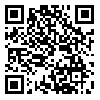BibTeX | RIS | EndNote | Medlars | ProCite | Reference Manager | RefWorks
Send citation to:
URL: http://tumj.tums.ac.ir/article-1-542-en.html
Background: The Temperament and Character Inventory (TCI) efficiently diagnoses personality disorders, differentiating the individual subtypes. This research aimed to evaluate personality dimensions using the Cloninger TCI (TCI-125) in a group of people with borderline personality disorders at Ruzbeh Hospital, Tehran, Iran.
Methods: In this descriptive cross-sectional study, 27 borderline personality patients were evaluated with a clinical interview based on the Diagnostic and Statistical Manual of Mental Disorders fourth edition text revision (DSM-ІV-TR) and Structured Clinical Interview for DSM-ІV Axis IІ (SCIDII). Depression and anxiety scores of patients were assessed using the Beck Depression Inventory (BDI) and Beck Anxiety Inventory (BAI) questionnaires. Dimensions of temperament and character traits were assessed using the TCI-125. The findings were compared with parameters of the normal Iranian population.
Results: Results showed higher scores for novelty seeking and harm avoidance and lower scores for self directedness, self transcendence and cooperativeness in borderline personality disorder patients.
Conclusion: The results of the Cloninger TCI in this study showed higher scores for novelty seeking and harm avoidance and lower scores for self directedness than those of the normal Iranian population. Scores for reward dependence fell within the range of the normal population. Lower scores for character factors, such as self directedness, cooperativeness and self transcendence, are usually associated with cluster B personality traits. Higher scores for novelty seeking and harm avoidance are usually characteristic of borderline personality disorder patients. In this study, there is the possibility that the small sample size or other factors, such as medication or substance abuse, might affect the study, resulting in normal scores for reward dependence.
| Rights and permissions | |
 |
This work is licensed under a Creative Commons Attribution-NonCommercial 4.0 International License. |





